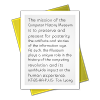Title
Stanley, Tom (Thomas) oral historyCatalog Number
102702047Type
DocumentDescription
Thomas O. Stanley was a solid-state engineer at RCA Laboratories in Princeton, New Jersey in the 1950s and early 1960s. William Webster appointed him as a dual group head in both the Systems Research Laboratory and the Electronics Research Laboratory. Stanley's group in 1960 calculated the potential for storing and retrieving information from a vinyl disc using a form of information storage known as electrical capacitance - the CED concept ultimately adapted for the RCA VideoDisc system.In 1966, Thomas Stanley joined the new Business Evaluation staff at the company. In 1968, Stanley became director of the newly formed Consumer Electronics Laboratory after Webster became President of RCA Laboratories. Having these two proponents of the capacitive encoding concept in powerful management positions allowed the Discpix project to survive the difficult basic research stages of the late 1960s. For his fundamental investigation of the CED concept, Thomas Stanley was awarded US Patent No. 3783196 on January 1, 1974. This was one of the first three CED patents filed on March 22, 1971, ten years to the day before the market introduction of the RCA VideoDisc system.
In 1981, Stanley, then Staff Vice President, Research Programs, was honored with the David Sarnoff Award for his early contributions to RCA's VideoDisc developments. Mr. Stanley was cited as "a visionary who, not only foresaw the CED videodisc system long before its time, but provided the technical encouragement and management support necessary to bring that vision to a reality."
This oral history of Thomas O. Stanley also includes detailed commentary on RCA's efforts in the early years of the semiconductor and computing technologies and industries.
Date
2009-03-31Contributor
| Brock, David C., Interviewer |
| Hendrie, Gardner, Interviewer; Cameraperson |
| Stanley, Thomas, Interviewee |


